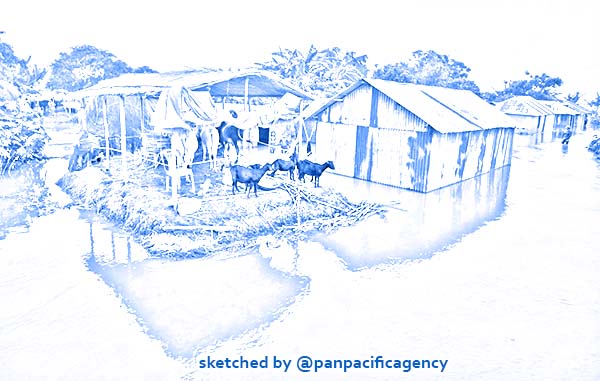Flooding soaks South Asia, displacing millions during Covid-19 woes

People and their livestock suffering alike as flood inundates vast area in northern districts Courtesy- Touhid Pervez Biplob. Photo: Dhaka Tribune. Sketched by the Pan Pacific Agency.
DHAKA, Aug 31, 2020, UNB. Floods triggered by heavy rains continue to wreak havoc in South Asia –one of the world’s most densely populated geographical regions — pummeling countries that have already been battered by the Covid-19 pandemic, Dhaka Tribune reported.
Since the monsoon season began, Pakistan, India, Bangladesh, Afghanistan and Nepal are among those being affected in the region that houses one-fourth of the world’s population, accompanied by growing risks of malaria, dengue, diarrhea and coronavirus.
The monsoon season of South Asia, which affects the Indian subcontinent every year from June through September, often brings cyclones and devastating floods in recent years and causes the displacement of millions of people living in low-lying areas.
Researchers suggested that climate change is causing more frequent extreme rainfall events and an increased risk of flooding in developed areas.
Afghanistan in triple woes
In Afghanistan, the flooding has added to the country’s woes posted by war and the ongoing pandemic.
At least 122 people were killed in torrential floods, 147 others wounded and several others went missing in 12 eastern provinces till Thursday, said the office of state minister for Disaster Management and Humanitarian Affairs.
The deadly floods also destroyed 1,500 houses, 23 shops, and more than 1,100 hectares of agriculture land in the region while 600 farm animals had also been lost, according to the ministry statistics.
Bomb attacks and violence are also witnessed in the country in the unresolved conflict between the Taliban and militants.
In the first six months of the year, more than 1,200 civilians had been killed and over 1,700 others injured, according to Naeem Nazari, deputy head of Afghanistan Independent Human Rights Commission.
The war-battered country on Sunday reported 22 newly confirmed Covid-19 cases after health authorities have conducted 247 tests since early Saturday, bringing the total number of cases to 38,165 with 1,402 deaths since the outbreak of the pandemic in February.
Floods plus pandemic
Monsoon rains are also pounding Pakistan and India at a time when the authorities are trying to contain the spread of Covid-19 and other contagious diseases, which has caused around 70,000 deaths altogether in the two countries.
At least 12 people were killed in floods and rain-related incidents in India’s eastern state of Odisha, officials said Saturday. August has seen the highest rainfall in the past over four decades, according to India’s state-run broadcaster All India Radio (AIR).
According to Bihar Disaster Management Department (BDMD), the ongoing floods have inundated 16 districts across the state affecting a population of 8,362,451.
While in Pakistan, at least 163 people have been killed and another 101 injured since June 15 in separate incidents triggered by torrential monsoon rains, the National Disaster Management Authority (NDMA) said in a report on Sunday.
South Sindh province was the worst hit where 61 people were killed and 22 others injured in the rain-related incidents, the authority said, adding that 59 houses were also damaged in the heavy downpour.
Provincial capital Karachi of Sindh was worst-hit in the rains where urban flooding brought life to a standstill. According to local media reports, 90% of commercial activities were halted in the city after heavy downpours started lashing the city days ago and are still continuing.
Chief Minister of Sindh Syed Murad Ali Shah told a press conference on Friday that 604-mm rainfall was recorded in Karachi during August, breaking the years-long record of heavy rains in the city during the month.
“Vast inland seas of stagnant water create an ideal breeding ground for mosquitoes, with a soaring risk of diseases like dengue and malaria,” said Abhishek Rimal, IFRC’s Regional Emergency Health Coordinator in Asia Pacific.
The Pakistan Meteorological Department has predicted more torrential rains in parts of the country on Monday and issued warning of urban flooding in some cities including Karachi.
On the front of the pandemic, India on Sunday reported 78,761 new daily Covid-19 cases and 948 deaths as the Covid-19 tally surpassed 3.5 million. The total number of cases rose to 3,542,733, with 63,498 deaths, showed the latest data released by the country’s health ministry.
Pakistan recorded a total number of 295,636 cases and 6,288 deaths, according to the latest figure released by the government, while the fatality from the pandemic in Nepal doubled in just two weeks on Saturday.
Water levels recede in Bangladesh
In a similar crisis faced by Bangladesh, 1,897 new Covid-19 cases and 42 new deaths were reported on Sunday, making the total tally at 310,822 and total deaths at 4,248 respectively, the Directorate General of Health Services (DGHS) said.
The overall flood situation in Bangladesh, after three waves of devastating floods, has improved in most of the districts with water levels receding at most of the 101 observation points across the four major river basins.
According to a flood report of the country’s Health Emergency Operation Centre and Control Room, the floods have killed 226 people in 33 (out of 64) districts since June 30. The loss of crops due to floods has been put at Tk13.23 billion (about $156.4 million).
Bangladeshi Agriculture Minister Abdur Razzaque told journalists last week that crops on 1.58 lakh hectares of land in 37 districts had been destroyed.